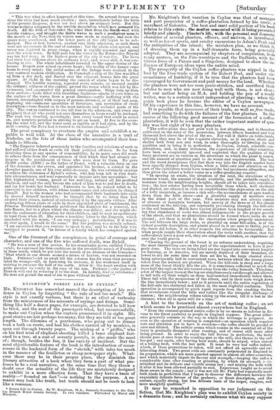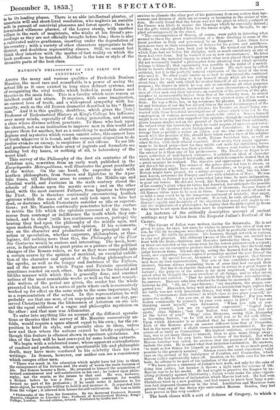KNIGHTON'S FOREST LIFE IN CEYLON. * Mn. KNIGHTON has somewhat marred
the description of his resi- dence in Ceylon by forgettino.b "the rule of not too much." His style is not exactly verbose, but there is an effect of verbosity from the minuteness of his accounts of sayings and doings. Some- thing like half a dozen pages, for example, are devoted to tell how he tried, and the rest of the passengers tried, but unsuccessfully, to make out Ceylon when the captain pronounced it in sight. His good stories are not perhaps too many, but they are told at too great length. The dilemma of a gentleman, who going out to dinner took a bath en route, and had his clothes carried off by monkies, is spun out through twenty pages. The mishap of a " griffin " who on his first trial of elephant-shooting killed a tame elephant fast- ened to a tree, at a cost of seventy pounds, is also made the most of; though, besides the fun, it has variety of incident But the most objectionable feature of the book is the introduction of occur- rences in the hacknied form of the "sketch," with tales too much in the manner of the feuilleton or cheap-newspaper style. What- ever these may be in their proper place, they diminish the literary attraction of a book when they form a part of what pro- fesses to be a real narrative, at the same time that they throw a doubt over the actuality of the life they are mistakenly designed to exhibit in a more effective form. That they have a basis of reality—" founded on fact "—is nothing to the purpose. A ro- mance may look like truth, but truth should not be made to look like a romance.
• Forest Life in Ceylon. By W. Knighton, M.A., formerly Secretary to the Cey- lon Branch Royal Asiatic Society. In two volumes. Published by Hurst and Blackett.
Mr. Knighton's first vocation in Ceylon was that of manager and part proprietor of a coffee-plantation formed by his uncle, a merchant of Colombo. The best and thott solid portion of hie book relates to this estate ; the matter connected with it being presented briefly and plainly. Planter's life, with the personal and domestic character of several planters, officers, and natives, is introduced, as well as forest sports, and sundry excursions to Adam's Peak and the antiquities of the island ; the mistaken plan, as we think it of dressing them up in a half-dramatic form, being generally adopted. They are accompanied by chapters of compilation, from ready sources, on the Fire-worshipers and the Budhists, with titious lives of a Parsee and a Singalese, designed to show the in-- iluence of European ideas upon the native mind. The prosperity of the Ceylon coffee-planters was nipped in the bud by the Free-trade system of Sir Robert Peel, and under cir- cumstances of hardship, if it be true that the planters had been encouraged by Government and paid money for the land. Whether the planters were not too soon panic-stricken, and sacrificed their estates to men who are now doing well with them, is not clear; but our author being an M.A. and holding the pen of a ready writer, was to a certain extent independent of planting; when the panic took place he became the editor of a Ceylon newspaper. Of his experience in this line, however, we have no account. It is possible that ignorance of their trade, as well as free trade, had something to do with the failures of the first planters In the course of the following good account of the formation of a coffee- plantation, it will be seen that the rather important matter of qua- lity was lost sight of by many planters. "The coffee-plant does not grow well in low situations, and is therefore cultivated on the sides of the mountains, between fifteen hundred and four thousand feet above the level of the sea. Nor will it thrive on table-lands, although they may be of the requisite elevation, as it requires shade and shelter both from sun and wiud, in order thoroughly tco litgelop its best qualities and to bring it to perfection. In Ceylon, indeed, scientific con- siderations, and, in many instances, the experience of all other countries, have been BO completely ignored and neglected that the qualities of the berry produced are as various as the situations in which the plant is reared, and the amount of attention paid to its wants and requirements. The best and the worst descriptions that find their way into the English market have been equally shipped from Ceylon, when a little care and attention on the part of the cultivators would have removed the bad specimens altogether, and thus given the island a better name as a coffee-producing country.
"In opening an estate, the situation of the land, the directions of the monsoon winds, the amount of shade available, and the probable supply of moisture from the neighbouring heights, should all be taken into considera- tion; the best estates having been invariably those which, well sheltered and shaded, are situated in such an amphitheatre-like depression on the side of a lofty mountain, as insures a rich soil—the accumulations of ages washed down from the hills above—and a plentiful supply of moisture even in the driest part of the year. This moisture may not always consist of streams or mountain torrents, but merely of the dews or of the clouds condensed on the hill-top, and constantly percolating through the to the soil beneath. Much have Ceylon planters been laughed at for assert- ing that abundance of rocks was almost indispensable to the proper growth of the shrub, and that no plantations should be formed where rocks do not abound ; yet there is truth in the observation when properly understood. The soil between the large rocks, so plentiful on some hill-sides, is of the richest possible description, and plants placed in it are sure to thrive, just as the forest did before, if in other respects the situation be favourable. But when people couple their observation about the rocks with another, that the coffee-shrub loves a poor soil, they are altogether mistaken, as experience all over the world proves. "Clearing the ground of the forest is an arduous undertaking, requiring the most itnremitting care on the part of the superintendent to have it pro- perly done. The trees on being felled are not lopped into convenient lengths for burning, as in America, but are merely deprived of their branches, al- lowed to dry for some time and then set fire to, the large charred stems being subsequently laid in convenient rows, between which the young plants taken from the nursery are planted. When the hill-side is steep and a large mass of the forest thickly fills the air, it is sometimes sufficient to notch the trees half through on the aide turned away from the valley beneath. This done, a few of the largest trees at the top are simultaneously cut through and allowed to fall with all their weight on those half-notched immediately below them. These fall with the momentum of the others, and in their turn weigh down the line immediately below; and so it proceeds until the entire vegetation of the hill-side lies shattered and fallen in the most frightful confusion. This operation is accompanied by quick rapid reports from the crashing timber, that reverberate round the hills and vallies like the irregular discharge of cannon ; the neighbouring echoes taking up the sound, till it is lost in the distance, when all is again still for a time."
A hint to the housewife on the art of making coffee ; an art which seems to be practised almost everywhere but in England.
"Even the coarsest-grained native coffee is by no means so inferior in fla- vour to the finest peaberry as people in England suppose. The great differ- ence generally consists in the way in which the beverage is prepared. As B0011 as the operation of roasting is completed—an operation which requires care and attention not to have it overdone—the coffee should be ground at once and diluted. The subtile aroma which resides in the essential oil of the berry is gradually dissipated after roasting, and of course still more after being ground. In order to enjoy the full flavour in perfection, the berry should pass at once from the roasting-pan to the mill, and thence to the cof- fee-pot ; and again, after having been made, should be mixed, when almost at a boiling heat, with the hot milk. It must be very bad coffee indeed, which, if these precautions be taken, will not afford an agreeable and ex- hilarating drink. Two great evils are constantly perpetrated in England in its preparation, which are more guarded against in almost all other countries, and which materially impair its flavour and strongth,—keeping the coffee a considerable time after roasting or grinding, by which its strength is di- minished and its delicate and volatile aroma lest; and mixing the milk with it after it has been allowed partially to cool. Experience taught us to avoid these errors in the jungle ; and it was not till Mr. Pinto had repeatedly made both kinds in perfection that I began to discover the difference between the exquisitely delicate flavour of the peaberry, or finest description, and the coarser, equally strong, but less delicate taste of the larger, rougher, and more unsightly qualities."
It may be remarked in opposition to our judgment on the fiction, that Mr. Knighton's plan was to exhibit Ceylon society in a dramatic form; and he certainly embraces what we may suppose to be its leading phases. There is an able intellectual planter, of uncertain will and short-lived resolution, who neglects an amiable wife in pursuit of convivial pleasures and forest sports; there is a lowminded villanons planter, of the Legree stamp, with another villain in the rank of magistrate, who winks at his friend's pro- ceedings as they are not officially brought before him; there is also a cultivated native gentleman, smarting under the degradation of his country ; with a variety of other characters appropriate to the district, and doubtless representing classes. Still, we cannot but think they interfere with the matter-of-fact reality on which the book professes to be founded. Neither is the tone or style of the dramatic parts of the best class.





































 Previous page
Previous page